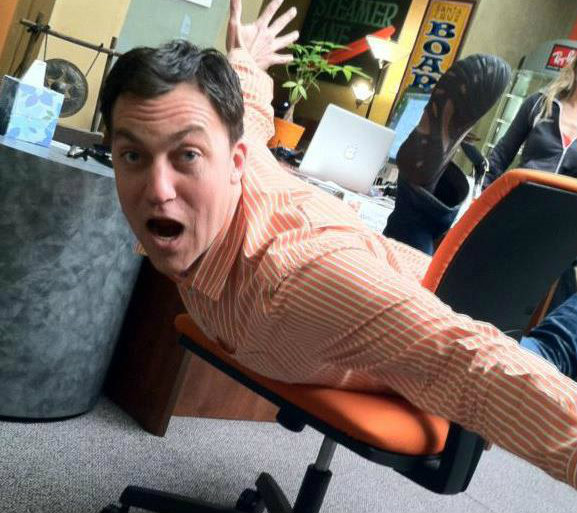You don't have to be an economic analyst to realize that the American workforce has changed dramatically over the past few years. Make that the global workforce.
Our parents finished school, then spent the next 30 years at the same company. Job security, health insurance, a pension, and a gold watch at retirement were expected rewards for long-term loyalty. Happiness and personal satisfaction rarely figured into the mix, if ever.
Thanks to wireless technologies, a new net-savvy generation coming up, and a shift in cultural values, this cubicle-bound style of work is going the way of the dodo, and not a moment too soon.
"The rules of work have changed," write Ryan Coonerty and Jeremy Neuner in their new book, The Rise of the Naked Economy. "Fundamental leaps in technology, demographics, and economics are driving a once-a-century shift in how, when, where, and why we work."
Their book offers a view from trenches of this shift as they are co-founders of NextSpace, a pioneering chain of coworking spaces known for building community among indy workers.
We recently caught up with Neuner to find out more about the book and the decidedly-positive trends reintroducing flexibility, collaboration, and a wee bit of nakedness back into the workforce.
Shareable: Not so long ago, it was considered risky, even a little bit crazy to abandon a traditional job for the freelance life. Now, your book suggests 40 percent of the workforce will be "fractional" or "disaggregated" by the end of the decade. What's changed?
JN: That’s right: for a long time, there was a stigma around freelancing. Too often, our society viewed freelancers as people who couldn’t get “real jobs”. The biggest change is that technology—the means of production in the information and innovation economy—is now in the hands of individuals instead of companies.
As a freelancer, independent consultant, or entrepreneur, a couple thousand dollars gets me a laptop, a mobile phone, and a range of inexpensive (and increasingly free) software tools.
Social technologies allow me to tap into people, ideas, and markets across town or across the world. And a strengthening of the ethos of access-not-ownership means that I can get access to a wider range of tools and technologies. Putting the means of production back into the hands of individuals is really revolutionary.

Shareable: In the book, you compare the Naked Economy to the agricultural and industrial revolutions of generations past. What are the similarities and differences between what's happening now and these major events in human history?
JN: These past revolutions completely changed how, where, and why we work. The Naked Economy will do the same thing. And, just like the economic revolutions of the past, the rise of the Naked Economy will have all sorts of ripple effects throughout the rest of the our society. We’ll see changes in where we live, how we educate our kids, how we get around, and what we ultimately value in our lives. So it will be a big shift!
Like any major shift, there will be downsides and unintended consequences. The industrial revolution definitely had lots of those. Fortunately, we’re early in the shift, so there’s time to recognize and plan for some of these consequences. We hope our book serves as a conversation-starter for workers, companies, and governments.
Shareable: Lots of people claim social technologies are replacing face-to-face interaction, and soon we won't know how to communicate without a screen between us. Yet in the book, you say that the Naked Economy uses technology to help people "rediscover and reclaim some of their fundamental humanity." How?
JN: We’re big fans of social technologies. As I mentioned above, these technologies are a big reason why freelancers can now operate in the global marketplace. And social technologies allow for the free flow of ideas at a rate never seen before. That’s generally good news for an innovation-based economy. At the same time, people are realizing that just because you’re my friend on Facebook doesn’t mean you’re actually my friend! So people are hungry for real, live, genuine human community. That need is hard-wired in our brains. The need to slog through the morning/evening commutes and languish in a cubicle is definitely NOT hard-wired in our brains.
The Naked Economy allows us to connect to the rest of the world, but it also affords us the chance to become deeply invested in our local communities. By abandoning the 9-5 grind and working on our own terms, people have the opportunity to meet their neighbors, coach their kid’s soccer team, attend a city council meeting, or volunteer in their communities. We need to re-build the tight-knit social fabric that holds our society together and the Naked Economy will allow us to do that.
Shareable: You mention that new infrastructure, new strategies and policies, are needed to support this revolution. What policy changes are needed most, and how do we help put them in place?
JN: Bazillions of pages have been written about reforming healthcare policy, tax policy, and retirement policy. For the past 50-75 years, our employers have handled these critical aspects of our social framework. But by 2020, 60 million Americans won’t have employers. That’s 40% of the workforce! So we need to de-couple our social framework from employment. Make no mistake, this is a very tall order. But if we don’t start thinking about a new social and economic framework that works for these 60 million people, we’re going to be in big trouble. Even people with “real jobs” change employers every three to five years. So we might start by improving the portability of healthcare and retirement benefits as workers move from job to job and gig to gig.
Shareable: What advice would you give someone who's tired of the 9-5, meetings, and TPS reports? How do we shed that first layer of clothing?
JN: The biggest thing is simply to recognize that there is, in fact, another way to work. What we consider to be “normal” in the current way most of us work is actually pretty abnormal, especially when viewed against the 100,000-year long history of human work. In the book, we try to tell optimistic stories of regular people who are succeeding on the frontier of this enormous economic shift. We hope these stories will inspire other people to take the leap and think differently about how they make a living and make a life. If you care about the future competitiveness of our economy; the daily well-being of you, your family, and your community; and the health of our planet, please read the book—clothing is optional…!
The Rise of the Naked Economy is available on Amazon, and in select bookstores and libraries nationwide.









